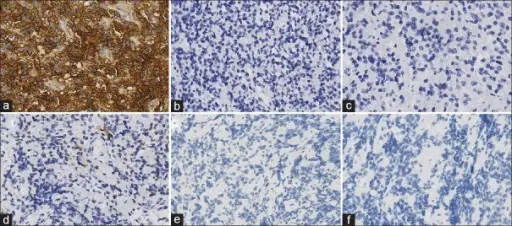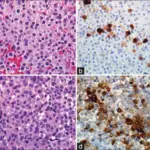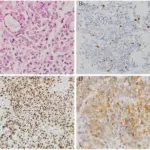Thyrotroph adenomas are TSH-producing adenomas, rare, representing roughly 1% of all pituitary adenomas.
Associated syndromes include:
- Hyperthyroidism
What is the Pathology of Thyrotroph Adenomas?
The pathology of thyrotroph adenomas is:
-Etiology: The cause of thyrotroph adenomas is hyperthyroidism, genetic changes
-Genes involved: Multiple endocrine neoplasia, type I (MEN1)
-Pathogenesis: The sequence of events that lead to thyrotroph adenomas is growth of pituitary thyrotroph cells. The mutation and activation of Gsα result in the generation of cyclic adenosine monophosphate (cAMP), a potent mitogenic stimulus for variety of endocrine cell types, hence endorsing hormone synthesis and secretion and cellular proliferation.
-Morphology: The morphology associated with thyrotroph adenomas shows its macroadenoma.
-Histology: The histology associated with thyrotroph adenomas shows it is chromophobic, with angular/ irregular cells.
How does Thyrotroph Adenomas Present?
Patients with thyrotroph adenomas typically has equal frequency male and female present at age range of 8 to 84 years old. The symptoms, features, and clinical findings associated with thyrotroph adenomas include hyperthyroidism signs and symptoms, visual field blemishes, headache.
How is Thyrotroph Adenomas Diagnosed?
Thyrotroph adenomas is diagnosed through laboratory studies, imaging, and biopsy.
How is Thyrotroph Adenomas Treated?
Thyrotroph adenomas is treated through surgical resection, pituitary radiotherapy, dopamine agonists, and somatostatin analogs.
What is the Prognosis of Thyrotroph Adenomas?
The prognosis of thyrotroph adenomas is good. Its recurrence does not seem to be frequent.



